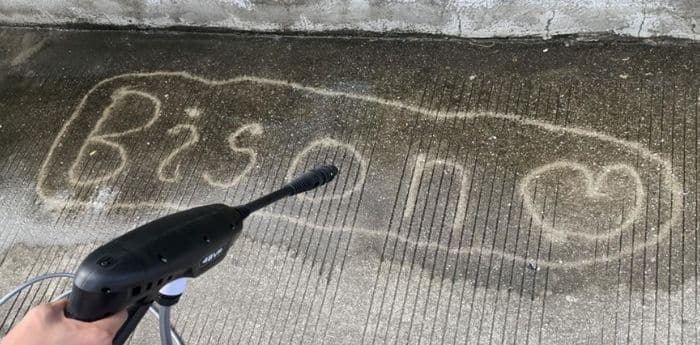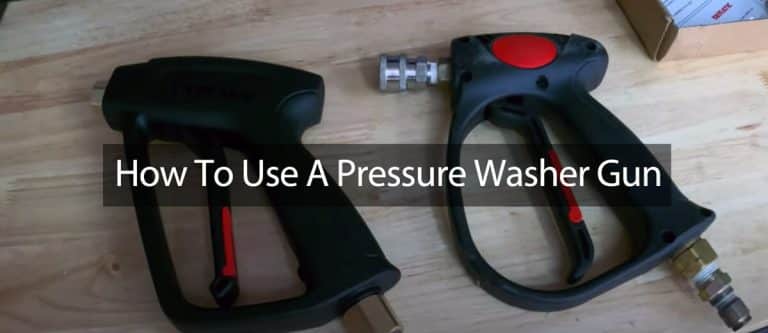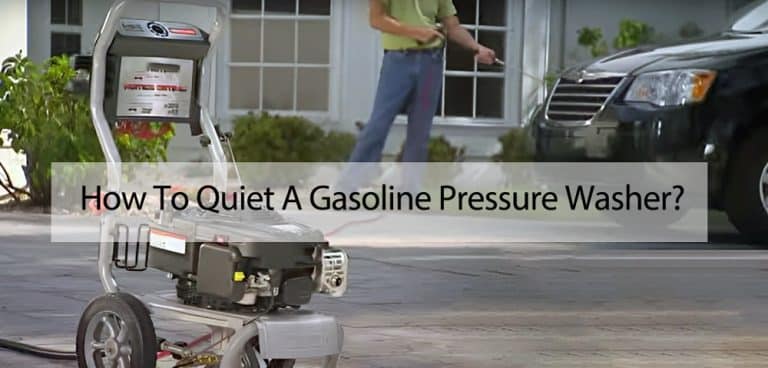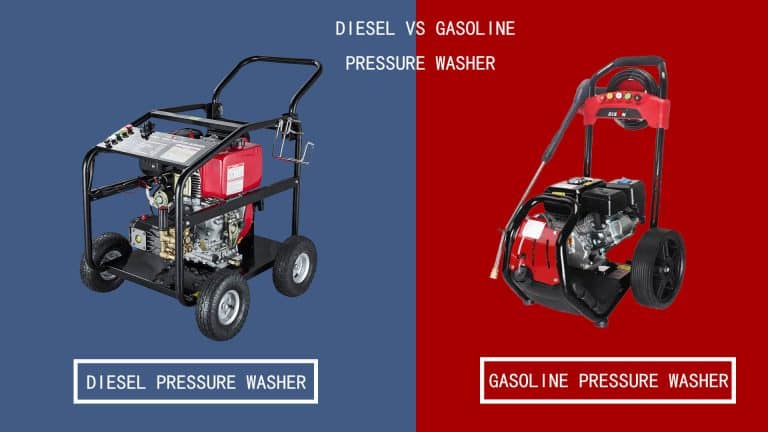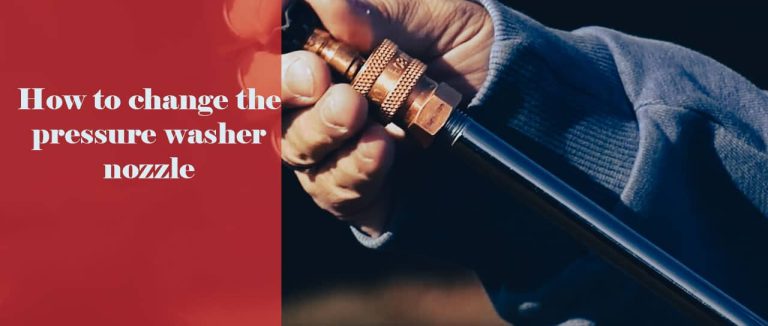It’s frustrating when your pressure washers won’t start. There are many reasons why your pressure washer won’t start, but you can usually figure out what the problem is. We’ll outline some of the most common issues and how to fix them. We’ll also provide preventive maintenance tips to keep your pressure washer running smoothly. Finally, we’ll answer some frequently asked questions about pressure washers.
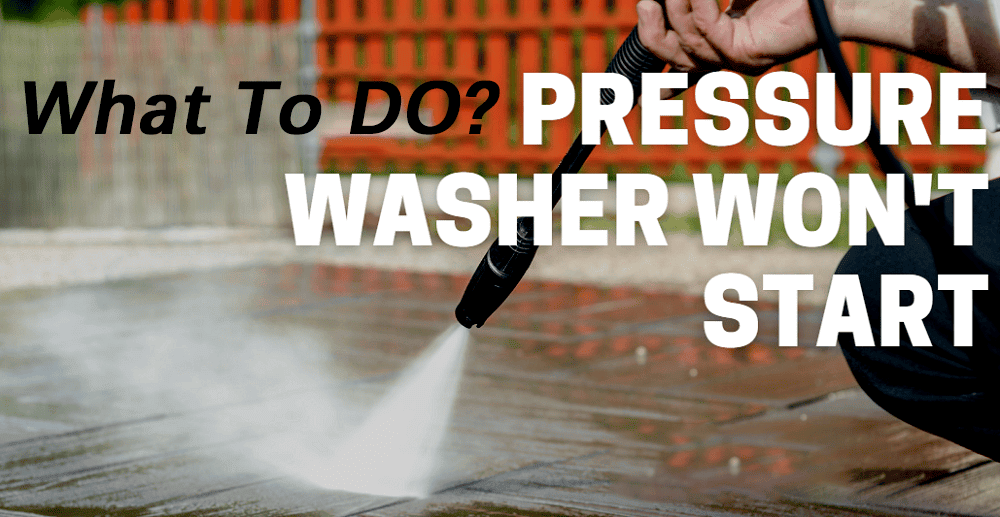
Check the basics first
Before you start troubleshooting, make sure to check the basics. First, ensure that the power cord is plugged in and the outlet works correctly. Or, if you have a gas pressure washer, ensure it has gas in its tank. Verify that the pressure washer is connected to a water source and that the hose is not kinked.
Next, check the oil level and top up if necessary. Finally, make sure to check the air filter and clean or replace it if dirty.
Troubleshooting a pressure washer startup
Carburetor clogged
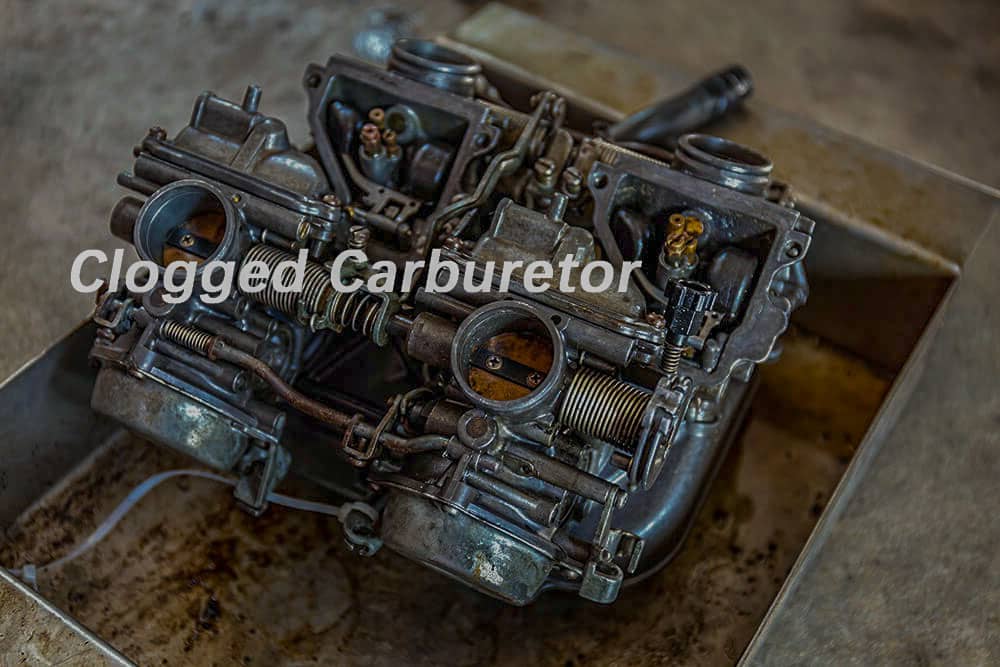
If your pressure washer doesn’t start, one of the problems could be a clogged carburetor. Old fuel, dirt, or debris can clog the carburetor, and leaving fuel in the pressure washer too long can cause the carburetor to clog.
To clean the carburetor:
- Close the fuel valve and remove the air filter and spark plug.
- Use a simple carburetor cleaner to clean the inside of the carburetor thoroughly. You can also use compressed air to blow away any dirt or debris.
- Reinstall the air filter and spark plugs, and start the pressure washer again.
Defective spark plug
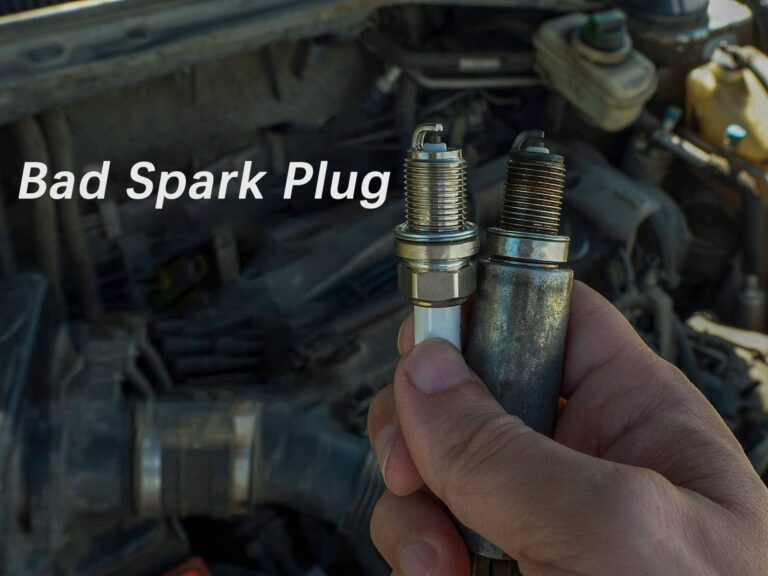
If your pressure washer won’t start, one of the problems could be a defective spark plug. The spark plug simply ignites the fuel in the engine, so if the spark plug is faulty, the engine will not start. Use a spark plug tester to confirm the spark plugs are working correctly.
You can also test the spark plugs by removing them and holding them against the engine. If you see sparks, the spark plugs are working correctly. If there is no spark, the plugs may be defective and must be replaced.
Simply replace damaged spark plugs. Replace spark plugs once a year.
Defective ignition coil
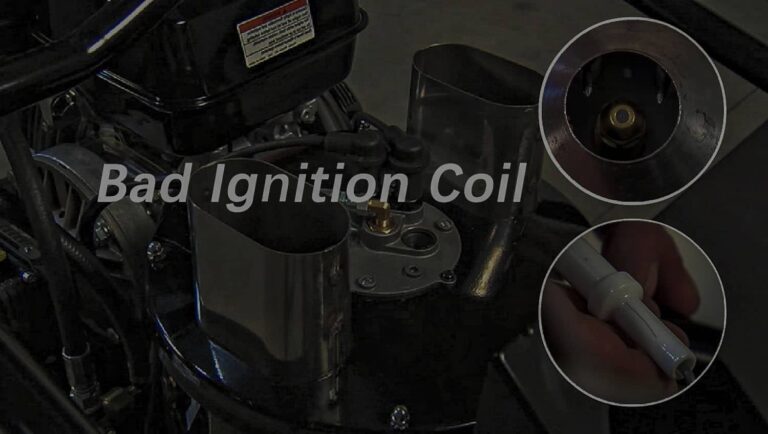
If your pressure washer won’t start, the problem could be a bad ignition coil. First, use a spark plug tester to rule out the possibility of defective spark plugs. If this test passes, then you may have a bad ignition coil. When the ignition coil fails, it does not create the spark to ignite the fuel in the pressure washer engine. You can use an ignition coil tester to confirm if this is the problem.
Flywheel key damaged
The problem could be a broken flywheel key if your pressure washer won’t start. The flywheel key is a tiny metal piece that connects the flywheel to the crankshaft. If this part breaks, it will prevent the engine from starting.
To repair a bad flywheel key, remove the spark plug, then remove the flywheel. Check the flywheel for any damage and replace it if necessary. Next, install the new flywheel key and reconnect. Finally, reconnect the spark plugs and try starting the pressure washer again.
Old fuel
The problem could be old or sticky fuel if your pressure washer won’t start. Over time, gasoline can become stale and less flammable. Gasoline stored in a pressure washer for over six months can become contaminated and oxidized. Contaminated gasoline can cause performance troubles. Drain the old fuel and pour fresh gas to the tank to solve this.
You can prevent this problem in the future by using a fuel stabilizer. Fuel stabilizers prevent fuel from breaking down and make it less flammable. Add stabilizer to the tank before storing your pressure washer for the winter.
Pump pressure too high
If your pressure washer won’t start, one of the problems could be overpressure on the pump. This is most likely due to a faulty pressure relief valve. The pressure relief valve relieves excess pressure in the pump, so if it is not working correctly, the pump will develop too much pressure.
To fix this:
- Turn off the pressure washer and relieve the pressure on the hose.
- Remove the pump from the pressure washer and then disassemble it.
- Check the pressure relief valve and clean or replace it if necessary.
- Reassemble the pump and carefully reinstall it on the pressure washer.
Fuel pump overheating
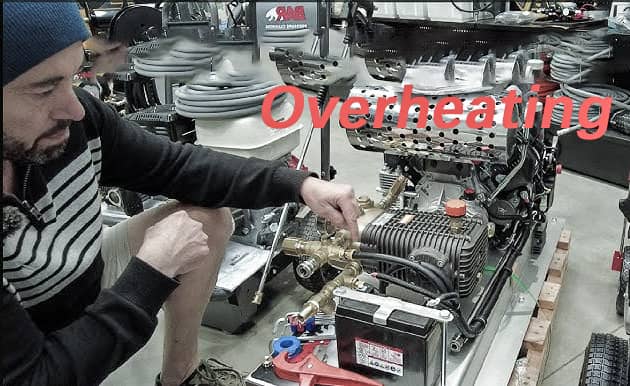
If your pressure washer won’t start, one issue could be an overheating fuel pump. The fuel pump smoothly delivers fuel to the engine, so it won’t be able to do its job if it overheats.
You can troubleshoot this problem by following previously described methods for overpressured pumps:
- Turn off the washer.
- Relieve hose pressure.
- Then disassemble the pump.
- Now inspect, clean, and replace the relief valve if necessary.
- Reassemble the pump.
The fuse is damaged
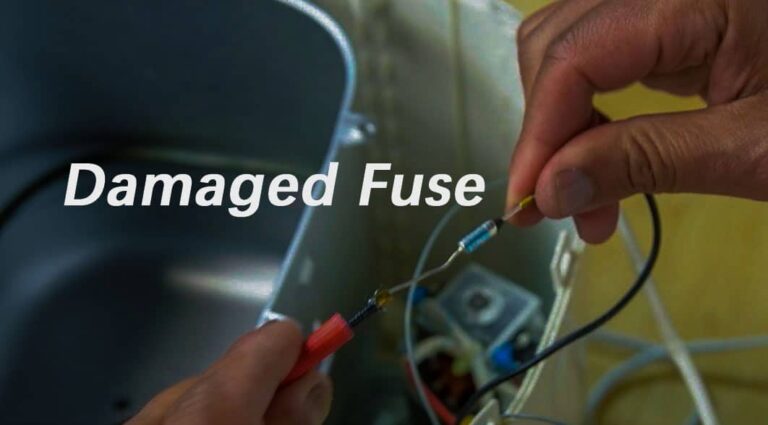
A bad or blown fuse is another common reason an electric pressure washer won’t work. Ensure the outlet and extension cord voltage is suitable for running the pressure washer. A lower voltage will cause the pressure washer to pull more current, which may cause the fuse to blow.
To troubleshoot fuses:
- Use a multimeter.
- Remove the fuse and place the multimeter probes on both ends of the fuse.
- Use resistor settings. If the multimeter shows high resistance, your pressure washer’s fuse is bad and needs to be replaced.
Moisture may be the cause of fuse failure. However, long extension cords with smaller gauges can also be used. Using such a long extension cord can create voltage. To keep the pressure washer running, the current increases to compensate and cause the fuse to fail. If the power cord is longer than 25 feet, use an extension cord with a 12-gauge wire.
Capacitor damaged
If the fuse of your pressure washer is not the problem, the following common cause of your pressure washer not starting is a bad capacitor. The capacitor is in the machine’s motor; the motor will not run if it burns out. To inspect the capacitor, use a screwdriver to loosen the motor’s housing. Bulging or blackening of the capacitor indicates damage. To repair a pressure washer, remove the burnt capacitor and replace it with a new one.
Proper pressure washer maintenance and use
First, read the pressure washer manufacturers instructions before using a pressure washer. This will ensure that you are using your pressure washer correctly and safely.
Next, be sure to do regular maintenance on your pressure washer. This includes changing the oil, checking and replacing spark plugs, and cleaning the air filter.
Pressure washers must also be stored in a dry, safe place when not in use. Never run a pressure washer without water flowing through it. To winterize your pressure washer, add a fuel stabilizer to the tank.
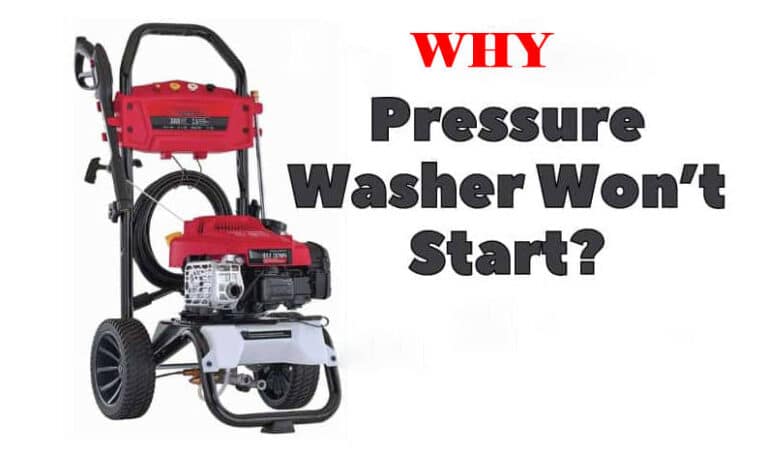
Safety tips for high-pressure washers
Always wear protective gear like gloves, goggles, and closed-toed shoes. Use a pressure washer in a well-ventilated area.
When using gasoline, never smoke and always know where the nearest fire extinguisher is. Always use caution when troubleshooting a pressure washer that won’t start.
Next, be aware of your surroundings and ensure children and pets are kept from the area where you will use the pressure washer. Never point the nozzle of a pressure washer at anyone else or at yourself. Finally, always start your pressure washer slowly to avoid injury.
Next, be aware of your surroundings and ensure children and pets are kept from the area where you will use the pressure washer. Never point the nozzle of a pressure washer at anyone else or at yourself. Finally, always start your pressure washer slowly to avoid injury.
First, read the pressure washer manufacturers instructions before using a pressure washer. This will ensure that you are using your pressure washer correctly and safely.
Next, be sure to do regular maintenance on your pressure washer. This includes changing the oil, checking and replacing spark plugs, and cleaning the air filter. Pressure washers must also be stored in a dry, safe place when not in use. Never run a pressure washer without water flowing therough it. To winterize your pressure washer, add a fuel stabilizer to the tank.
FAQs About What to do if your pressure washer won't start
If you cannot identify and fix the problem, most pressure washer manufacturers have authorized service shops where you can send the machine in for repair.
Turn on the pressure washer slowly while keeping the nozzle away from yourself and others. You can use it generally once you've verified that your pressure washer works correctly.
Pressure washers are generally durable, but the age of the machine can affect whether it can be serviced. Tell the technician its make and model if you decide to take your pressure washer in for service.
If you've exhausted all your options, it may be time to replace your pressure washer. Research the model that best suits your needs and budget before purchasing. Pressure washers can be expensive, so it's better to compare prices and features before deciding.
Electric pressure washers usually do not have fuses. The motor of an electric pressure washer is typically designed to handle a certain amount of power, and if it is too powerful, it may overheat or burn out.
Pressure washers are often the cleaning equipment of choice for many homeowners. They are commonly used by construction, automotive, and agricultural professionals.
Pressure washers can speed up the cleaning process by using high-pressure water to remove grime and dirt.
The most common problem with pressure washers is that they are challenging to use due to the high pressure. Many people don't know how to use them properly. If your pressure washer won't start when the water is turned on, check the power supply first.

